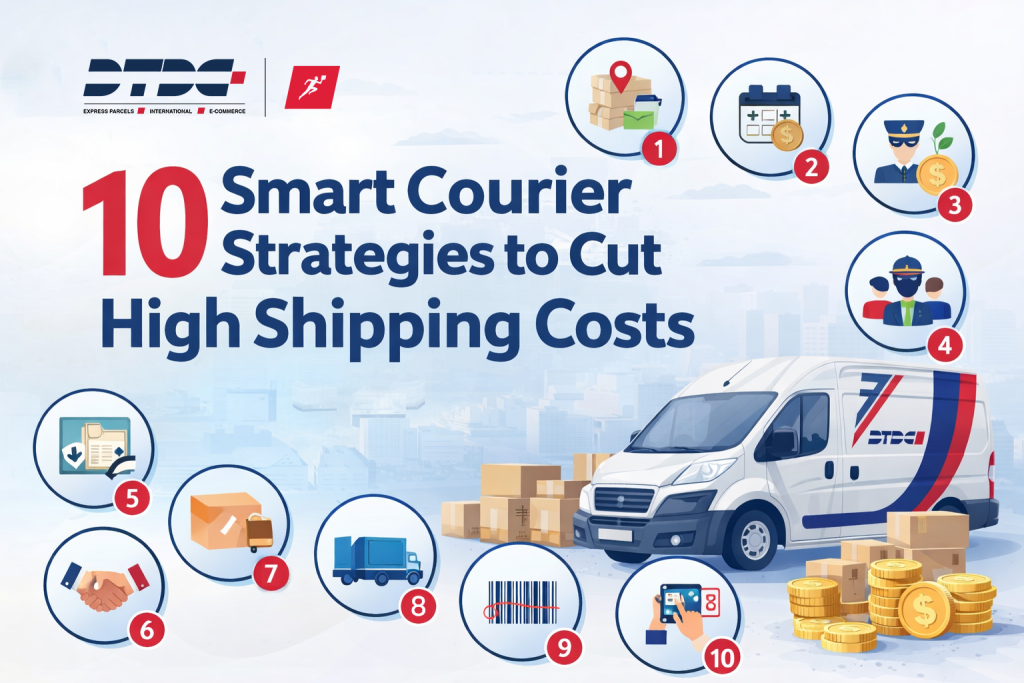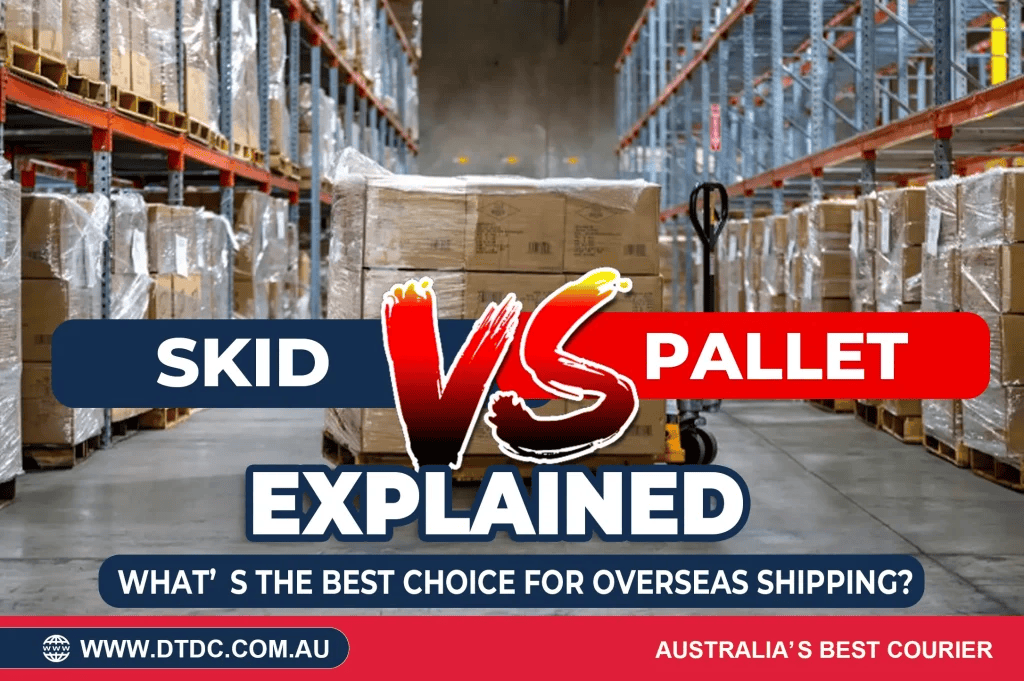If you are into overseas shipping, then there is a high chance that you have heard the terms skid vs pallet being used interchangeably. You may not have paid much attention to this, but knowing the difference can help secure your shipments. It’s not really about deciding which one is best, but rather which one suits the requirements of your shipment.
Through this article, we are trying to help you make this decision by going into detail about how these things work and the major differences between them. So stick around, as this might save you some money and effort on your next shipment.
Key Difference Between Skid and Pallet Platforms
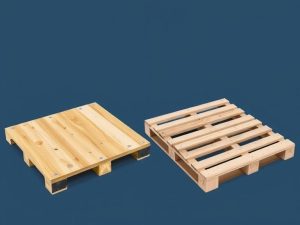
We don’t blame you for the confusion between skids and pallets, even expert workers often get confused between the two. The confusion stems from the similarity of appearance of both equipment. So let’s explore what the factors are that truly differentiate these similar looking things.
Design & Structure
Even though the appearance is similar, the skid pallet difference lies in the base structure. Skids only have the top deck board, and they rest on the floor on their pedestals. Pallets, on the other hand, have a top and bottom deck board, making their bottom a flat surface.
This design change in structures creates benefits and weaknesses for both the equipment. As a result, both can be used for different purposes. Skid and pallet difference is not limited to design.
Mobility & Handling
Pallets are usually preferred for packages that need to be handled with forklifts. Skids are more difficult to handle with a forklift as they do not have a bottom deck. The torque from the forklifts can cause failure of the skids, leading to damage to the packages.
Moving around the pallets is difficult unless you have a pallet jack. But the absence of a bottom deck creates less friction for the skid in comparison to a pallet, which makes it easier to move them around.
Stackability & Stability
The stackability of pallets is better as the bottom deck provides a flat surface of contact for stacking multiple pallets. By stacking the pallets, sturdiness and efficiency can be improved for withstanding larger loads.
The difference between pallet vs skid is more evident in stability. Pallets have multiple support points for supporting the top and bottom deck, making them more stable.. Absence of a bottom deck makes the skid less stable than the pallets.
Durability & Material Options
In terms of durability, skids edge past the pallets as they have fewer parts, which leads to less damage. The durability of either skids or pallets will heavily depend upon the kind of material used to build them.
Cost Factors
Pallets cost more than skids because of the presence of more parts. They also require more maintenance, which increases the cost of maintenance and repairs. The material of the structures also determines the cost.
Choosing between a skid or pallet for export logistics depends on the cargo type, route, and storage requirements.
Use Cases in Shipping Overseas
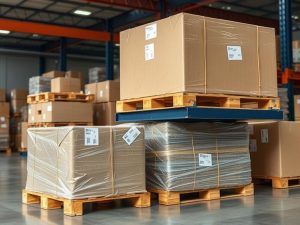
In case of shipping overseas, your shipments will be stored and handled in warehouses before shipping them abroad. During this period, skids or pallets will be used for handling these packages effectively. Choosing the right kind of structure ensures the safety of your shipment, along with controlling your costs.
Since you got an understanding of what skid is in shipping, now let’s look at when to use it.
When To Use Skids
Skids are ideal to use with heavy items as they are not likely to be moved around using a forklift. Using skids for these items also makes it easy to change their positions by pushing or pulling. Skids keep the machinery off the ground, protecting it from moisture and other substances.
Another advantage of skids is that storing empty skids takes up much less space because of their design. The pedestals of the skid can be designed in such a way that they sit inside each other.
When To Use Pallets
Pallets make more sense when more strength and stability are required for keeping that particular shipment. The additional bottom deck of the structure supports more weight, even if the weight is distributed unevenly.
Items that need to be handled by forklifts can be placed on pallets, as the bottom deck provides the support for the forks. Also, the flat deck provides more resistance, reducing the chances of the shipment slipping.
Export Compliance & Regulations
As an exporter, you should be aware of the regulations related to pallets and skids used for international shipping. Most countries have strict rules regarding these structures because of the materials used to build them. The regulations are stricter for pallets and skids made from wood.
Wooden pallets can carry pests and bugs, which can spread to different regions if they are not properly monitored. Regulations ensure that the pallets are safe to be used in the shipping process.
The International Standards for Phytosanitary Measures (ISPMs) is the organization responsible for maintaining the phytosanitary measures. ISPM 15 is the current international standard for regulating wooden pallets and skids in several countries, including Australia.
Another compliance to meet is the dimensions of the structures. The standard pallet size in Australia is 1165 mm x 1165 mm, and this varies among countries. Common export pallet dimensions in major regions are:
The US: 1000 mm x 1200 mm
Asia: 1100 mm x 1100 mm
Europe: 1200 mm x 800 mm
As an exporter, you need to be aware of the dimension requirements in the country that you are shipping into and choose your pallets accordingly. If you are partnering with a reputable shipping agency, then they will guide you to select the appropriate pallets. To know more, click here.
Skid vs Pallet Use Across Key Shipping Industries
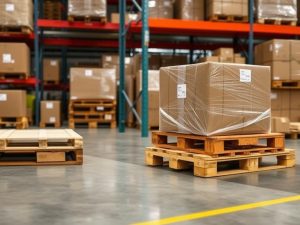
We have already established that pallets and skids can be used for slightly different purposes. There are some areas where pallets will be more useful and others where skids will be more useful.
Manufacturing
In the manufacturing sector skid for shipping heavy machinery is used, as often such equipment is not handled by forklifts. The use of skids allows easy movement of the machinery according to convenience.
Pallets can also be used in case additional strength and stability are needed. The stackable property of pallets will be of benefit in such scenarios.
Retail & Consumer Goods
Pallets are the main choice in the retail industry, as the dimensions of the pallets seamlessly match the standard rack systems. Additionally, they integrate well with the supply chain automation systems.
E-commerce & Fulfillment
In the e-commerce sector also pallets are preferred for the fulfillment of bulk orders. The packages come mostly in boxes of similar dimensions, which makes it easier to handle with forklifts. Use of pallets also helps in storage optimization.
Skids are also used in this sector, mainly during transportation in the last-mile delivery stage. This is the stage where the packages are moved around by the workers, and skids are appropriate for this.
E-commerce warehouses often alternate between skids and pallets depending on the order size and weight.
Aerospace & Automotive
The packages from this industry are of high value and should be handled with extreme care. Pallets are preferred to ensure this because of their stable structure. Skids are also used by customizing them for specific parts, which can reduce costs.
Common Mistakes To Avoid
- The most common mistake is confusion in the use of pallet vs skid for shipping.
- Choosing the wrong material for the structure.
- Not being aware of the regulations in the country to which you are shipping.
- Use of untreated wood for making the pallets or skids.
- Overloading pallets beyond their capacity.
Best Practices for International Freight Packing
- Ensure the load capacity of the skids or pallets is adequate for the item that you are shipping.
- Verify ISPM 15 certification for pallets or skids made from wood.
- Properly label the packages with the barcodes and instructions on how to handle them.
- Opt for the material of the structures based on the environment of the shipping route. For instance, plastic pallets are more suitable for humid regions.
How To Choose: Skid or Pallet?
In the first step, you should have clarity on what kind of goods you are shipping and the load capacity that it require. If you require more load capacity, then a pallet will be a better option, as that can also be stacked to further increase the load capacity.
Using pallets is costlier than using skids, and therefore, you can save money on the shipment by using skids. Also, empty skids use less space than empty pallets, which makes the storage and transportation easier, saving further money.
Thus, you can use skids where they can fulfill the purpose and save costs. In other areas where higher load capacity is needed or minimizing risk is a priority, you should use pallets.
Overall Comparison: Skids vs Pallets
| Feature | Skids | Pallets |
| Cost | Low | High |
| Efficiency | Low | High |
| Durability | Medium | High |
| Stackability | Low | High |
| Maintenance | Low | High |
Future Trends in Freight Platforms
Sustainable materials: Pallets made from biodegradable materials are gaining popularity in several industries. Also, recycled plastic is being used by many companies.
Module Designs: Fixed shape and size of the pallets or skids can limit their usage for certain packages. With modular designs, pallets can be modified based on the packages.
IoT equipped: Smart pallets with sensors tracking every detail about the package are also on the rise.
Taking Action: Optimize Your Overseas Shipping Platform
Shipping overseas is a complex area filled with regulations and limits. Reducing the cost involved in the shipping process is a plus for the business. But the safety and security of the packages should be maintained at the same time.
Gaining knowledge about skid vs pallet is a good step towards understanding international freight. This will help to optimize the system for maximum benefits. If you would also like to optimize your overseas shipping system, connect with our team of experts with a simple click.
Frequently Asked Questions (FAQ)
Are skids allowed for international shipping?
Yes, they can be used in international shipping if they meet the required standards.
What happens when pallets do not meet ISPM 15 requirements?
This can lead to significant delays, also leading to fines and even resulting in your shipment being returned to the origin in the worst case.
Which is more sustainable: skids or pallets?
Skids use fewer materials compared to pallets. The rest depends upon the type of material used for the structure. Pallets made from reusable plastics are much more sustainable.
What is the standard pallet size for international shipping?
The pallet dimensions approved by the ISO are 1200mm x 1000mm.
Can I reuse skids for multiple shipments?
Yes, they can be used if they are in good condition and meet the required standards. This is an encouraged practice in the industry.
What is a pallet jack?
It is equipped with a flat platform that helps in moving and lifting the pallets.



